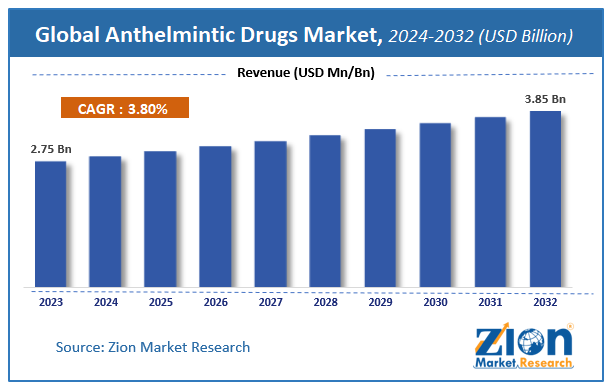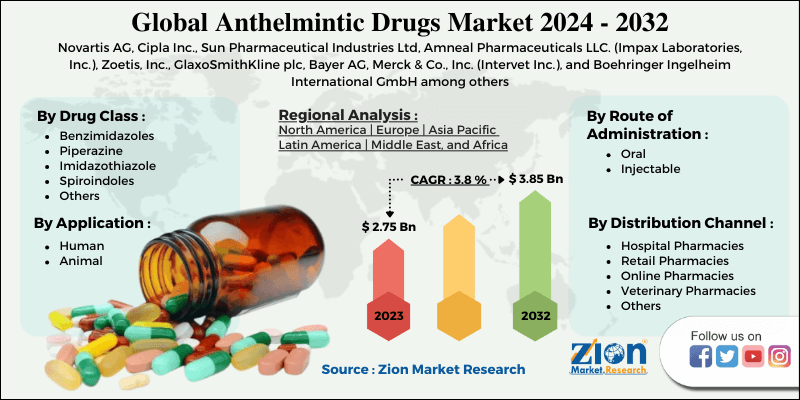Anthelmintic Drugs Market Size, Share, Analysis, Trends, Growth, 2032

Anthelmintic Drugs Market by Drug Class (Benzimidazoles, Piperazine, Imidazothiazole, Spiroindoles, Others) by Route of Administration (Oral, Injectable) by Application (Human, Animal) by Distribution Channel (Hospital Pharmacies, Retail Pharmacies, Online Pharmacies, Veterinary Pharmacies, Others): Global Industry Perspective, Comprehensive Analysis and Forecast, 2024 - 2032-
| Market Size in 2023 | Market Forecast in 2032 | CAGR (in %) | Base Year |
|---|---|---|---|
| USD 2.75 Billion | USD 3.85 Billion | 3.8% | 2023 |
Anthelmintic Drugs Market Insights
According to Zion Market Research, the global Anthelmintic Drugs Market was worth USD 2.75 Billion in 2023. The market is forecast to reach USD 3.85 Billion by 2032, growing at a compound annual growth rate (CAGR) of 3.8% during the forecast period 2024-2032. The report offers a comprehensive analysis of the market, highlighting the factors that will determine growth, potential challenges, and opportunities that could emerge in the Anthelmintic Drugs Market industry over the next decade.
 Request Free Sample
Request Free Sample
Global Anthelmintic Drugs Market: Overview
Anthelmintics is a group of parasitic drugs that extract parasitic worms (helminths) and other internal parasites from the body either by stunning or destroying them and without causing any damage to the host. They can also be referred to as vermifuges or vermicides. Anthelmintics is used to treat people who are diagnosed with helminths, an infection called helminthiasis. These medications are also used for the treatment of infected animals. The parasites are of considerable significance for tropical human medicine and veterinary medicine.
The World Health Organization reports that 2 billion people carry parasitic worm infections that cause increased mortality and morbidity, whereas parasitic worms that infect livestock is a critical animal welfare problem and pose a massive economic strain on food production. Domestic pets are also vulnerable to parasitic worm infection, and it should be noted that the companion animal industry is a key economic concern for animal welfare firms involved in drug development programmes.
Global Anthelmintic Drugs Market: Growth Factors
Effective use of anthelmintics in children is of significant public health interest since the parasites involved are likely to infect more than 2 billion people, most of whom are particularly prevalent and harmful in children. Properly targeted drug delivery, especially through community chemotherapy, can dramatically reduce aggregate mortality and morbidity as well as boost growth rates, physical activity and fitness, cognitive and academic performance and social well-being.
There are a variety of anthelmintics available for the management of gastrointestinal nematodes in cattle. Ostertagia ostertagi, lung worm, Fasciola hepatica, and Cooperia spp., are likely to cause the greatest losses in production in North America. Clorsulon is a fresh, safe anthelmintic that offers good control of the fluke of the liver and thus fills a void in control of cattle helminths in North America. The accurate use of anthelmintics in conjunction with management based on knowledge of parasite epidemiology will ensure that cattle are not easily reinfected. In this way, the advantages of the use of anthelmintics can be very substantial and much higher than the control costs.
Impact due to the outbreak of COVID-19
The ongoing outbreak of COVID-19 (coronavirus) created an alarming situation for medicines that could fend off a novel infection. Thus, AI (Artificial Intelligence) Gero is gaining worldwide recognition for specializing in AI-driven drug development and validating the promising potential of anthelmintic drugs for the treatment of COVID-19. Niclosamide is known to be relatively useful in the treatment of coronavirus in patients and has been approved in the United States, France, Italy and few other places where there is an increasing incidence of active COVID-19 patients.
As a result of the approval of niclosamide, businesses in the anthelmintic drug industry are increasing their effectiveness in AI-driven drug discovery approaches to focus on revenue generation prospects. Companies in the anthelmintic drugs industry are making efforts to perform clinical trials of existing drugs that could be useful in coronavirus medication.
Global Anthelmintic Drugs Market: Segmentation
Piperazine belongs to the family of antihelminthic drug that effectively blocks the cholinergic neuromuscular receptors in worms. It is easily consumed, but has an extremely unstable half-life. In the treatment of ascariasis, the adult oral intake of 4 grams of piperazine hydrate has been widely used. In most developed countries, it has been discontinued, largely due to concerns about potential carcinogenicity and electroencephalographic changes.
Piperazine does not cause adverse effects in most patients. There may be mild gastrointestinal disturbances; neurotoxicity is uncommon. Lacrimation, eczematous skin reactions, rhinorrhea, productive cough, joint pains, and bronchospasm can develop following sensitization, particularly with occupational exposure.
Benzimidazole is a heterocyclic compound formed from a ring of benzene and imidazole containing oxygen sulphur, nitrogen and its derivatives are of broad interest, both in terms of their inhibitory activity and their favorable selectivity ratio, due to their diverse clinical applications and biological activity.
The identified nucleus is a vitamin-B12 constituent. Benzimidazoles are known to be a promising class of bioactive heterocyclic compounds with a number of biological activities, such as anti-viral, anti-microbial, anti-diabetic, anti-oxidant, anti-cancer, anti-parasitic, anti-proliferative, anti-helminthic, anti-viral, and anti-HIV among others. Benzimidazoles demonstrate substantial activity as potential antitumor agents, intestinal cystitis therapy, smooth cell proliferation inhibitors, and in a number of areas of chemistry.
Anthelmintic Drugs Market: Report Scope
| Report Attributes | Report Details |
|---|---|
| Report Name | Anthelmintic Drugs Market |
| Market Size in 2023 | USD 2.75 Billion |
| Market Forecast in 2032 | USD 3.85 Billion |
| Growth Rate | CAGR of 3.8% |
| Number of Pages | 110 |
| Key Companies Covered | Novartis AG, Cipla Inc., Sun Pharmaceutical Industries Ltd, Amneal Pharmaceuticals LLC. (Impax Laboratories, Inc.), Zoetis, Inc., GlaxoSmithKline plc, Bayer AG, Merck & Co., Inc. (Intervet Inc.), and Boehringer Ingelheim International GmbH among others. |
| Segments Covered | By Drug Class, By Route Of Administration, By Application, By Distribution Channel and By Region |
| Regions Covered | North America, Europe, Asia Pacific (APAC), Latin America, Middle East, and Africa (MEA) |
| Base Year | 2023 |
| Historical Year | 2018 to 2022 |
| Forecast Year | 2024 - 2032 |
| Customization Scope | Avail customized purchase options to meet your exact research needs. Request For Customization |
Global Anthelmintic Drugs Market: Regional Analysis
By Geography, the anthelmintic drugs market is segmented into North America, Europe, Latin America, Asia Pacific, and Middle East and Africa.
Europe accounted for the largest market for anthelmintic drugs in 2019, followed by Asia Pacific. The number of pet animals in the region is growing at a higher rate than that of livestock, leading to an increase in pet ownership, thereby the involvement of key players supplying anthelmintic drugs is also progressing. This, in turn, is expected to improve the growth of anthelmintic drugs market in the region.
The demand for anthelmintic drugs in Asia Pacific is likely to grow to the highest CAGR from 2024 to 2032. The growth of the market in the region can be attributed to a wide veterinary sector in China, New Zealand and Australia. Growing expenditure on pet care; increasing demand for animal care; and rising demand for veterinary hospitals and clinics in India, China, South Korea, and Hong Kong are some of the factors boosting the demand for anthelmintic drugs in the region.
Global Anthelmintic Drugs Market: Competitive Players
The major players in the global anthelmintic drugs market include
- Novartis AG, Cipla Inc.
- Sun Pharmaceutical Industries Ltd
- Amneal Pharmaceuticals LLC. (Impax Laboratories. Inc.)
- Zoetis, Inc.
- GlaxoSmithKline plc
- Bayer AG
- Merck & Co.Inc. (Intervet Inc.)
- Boehringer Ingelheim International GmbH
- among others.
The report segment of global anthelmintic drugs market are as follows:
Global Anthelmintic Drugs Market: Drug Class Segment Analysis
- Benzimidazoles
- Piperazine
- Imidazothiazole
- Spiroindoles
- Others
Global Anthelmintic Drugs Market: Route of Administration Segment Analysis
- Oral
- Injectable
Global Anthelmintic Drugs Market: Application Segment Analysis
- Human
- Animal
Global Anthelmintic Drugs Market: Distribution Channel Segment Analysis
- Hospital Pharmacies
- Retail Pharmacies
- Online Pharmacies
- Veterinary Pharmacies
- Others
Global Anthelmintic Drugs Market: Regional Segment Analysis
- North America
- The U.S.
- Canada
- Europe
- France
- The UK
- Spain
- Germany
- Italy
- Rest of Europe
- Asia Pacific
- China
- Japan
- India
- South Korea
- Southeast Asia
- Rest of Asia Pacific
- Latin America
- Brazil
- Mexico
- Rest of Latin America
- Middle East & Africa
- GCC
- South Africa
- Rest of Middle East & Africa
Table Of Content
Methodology
FrequentlyAsked Questions
Effective use of anthelmintics in children is of significant public health interest since the parasites involved are likely to infect more than 2 billion people, most of whom are particularly prevalent and harmful in children. Properly targeted drug delivery, especially through community chemotherapy, can dramatically reduce aggregate mortality and morbidity as well as boost growth rates, physical activity and fitness, cognitive and academic performance and social well-being
According to Zion Market Research, the global Anthelmintic Drugs Market was worth USD 2.75 Billion in 2023. The market is forecast to reach USD 3.85 Billion by 2032, growing at a compound annual growth rate (CAGR) of 3.8% during the forecast period 2024-2032.
By Geography, the anthelmintic drugs market is segmented into North America, Europe, Latin America, Asia Pacific, and Middle East and Africa.
Europe accounted for the largest market for anthelmintic drugs in 2019, followed by Asia Pacific. The number of pet animals in the region is growing at a higher rate than that of livestock, leading to an increase in pet ownership, thereby the involvement of key players supplying anthelmintic drugs is also progressing. This, in turn, is expected to improve the growth of anthelmintic drugs market in the region.
The major players in the global anthelmintic drugs market include Novartis AG, Cipla Inc., Sun Pharmaceutical Industries Ltd, Amneal Pharmaceuticals LLC. (Impax Laboratories, Inc.), Zoetis, Inc., GlaxoSmithKline plc, Bayer AG, Merck & Co., Inc. (Intervet Inc.), and Boehringer Ingelheim International GmbH among others.
Choose License Type
List of Contents
Market InsightsOverviewGrowth FactorsImpact due to the outbreak of COVID-19GlobalAnthelmintic DrugsSegmentationReport ScopeGlobalAnthelmintic DrugsMarket:Regional AnalysisGlobalAnthelmintic DrugsCompetitive PlayersThe report segment of global anthelmintic drugs market are as follows:Regional Segment AnalysisHappyClients
Zion Market Research
Tel: +1 (302) 444-0166
USA/Canada Toll Free No.+1 (855) 465-4651
3rd Floor,
Mrunal Paradise, Opp Maharaja Hotel,
Pimple Gurav, Pune 411061,
Maharashtra, India
Phone No +91 7768 006 007, +91 7768 006 008
US OFFICE NO +1 (302) 444-0166
US/CAN TOLL FREE +1 (855) 465-4651
Email: sales@zionmarketresearch.com
We have secured system to process your transaction.
Our support available to help you 24 hours a day, five days a week.
Monday - Friday: 9AM - 6PM
Saturday - Sunday: Closed






